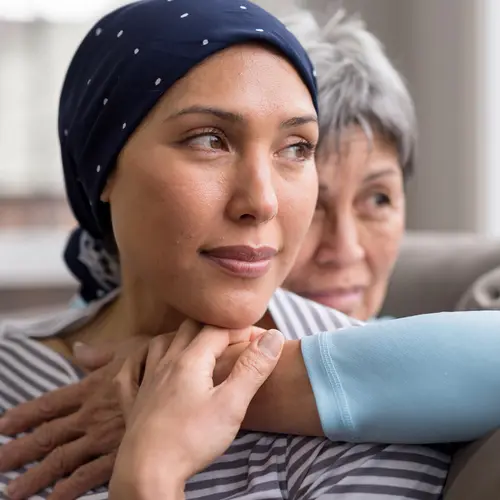When Your Breast Cancer Turns Metastatic

Hide Video Transcript
Video Transcript
DELTRA JAMES
Hi, I'm Deltra. And I've been living with metastatic breast cancer since 2019. I'm here to share some tips on what to do when your breast cancer has progressed to the metastatic stage. [MUSIC PLAYING]
Some ways to select a doctor that's best for your metastatic treatment is word of mouth. You can ask friends and family who have experience with cancer and live in your area, who they were treated by, and get recommendations. You can also get a referral from your primary physician because they may know some wonderful doctors.
You may also want to look into doctors who specialize in your specific subtype of cancer. When you're introducing yourself to a new doctor, you'll want to start by sharing a bit about who you are, because you're much more than just your diagnosis. You'll know if you're having good communication with your doctor when you feel heard, when you feel that your doctor is never rushed, and they listen to you, when they consider your input, and when they take the time to answer your questions.
Before starting your treatment, you'll want to seek out a second opinion. Don't worry about offending your current doctor. A good doctor will totally support you as you begin your health journey. Ultimately, it's your health journey and you need to feel total peace of mind with how you start it. When it comes to honesty, you'll want to be very upfront with your doctor. Your doctor is not there to judge you, they're there to listen.
Before going into your first doctor's appointment, try to avoid doing your own research. That may feel counterintuitive, but your doctor will be able to give you the most up-to-date and realistic, factual information. Googling can just create anxiety and overwhelm. And you don't need that right now. Either avoid researching yourself, or ask a loved one to do a bit of researching for you. And also remember that your story is your own. Someone else's story of their metastatic diagnosis is not yours.
When discussing early treatment, it's vital that you bring up any questions you have regarding how your treatments are going to impact you financially. Your doctor may not be the one to answer those questions, but they can certainly direct you towards the person on your team, maybe a social worker or a nurse navigator who can help you figure out and break down exactly what your treatments are going to cost you.
If you're having a hard time understanding something that your doctor has explained to you, don't let it go. It's OK to ask them to repeat themselves. It's OK to ask them to break it down for you because they may have explained it in terms that you're not familiar with. It's also OK to ask for more information so that you can take it home with you, perhaps a pamphlet, and digest it later. You can also ask to speak with a nurse navigator who may explain things to you better, or have a bit more time to have an in-depth conversation.
It can be very intimidating to be in a room full of doctors who have spent years studying a disease that is new to you. But just remember that you are the expert in your body. You're the only one living in it. Who knows what symptoms and side effects you may experience. So always bring up what you're feeling, whether physically or emotionally, to your team, and push until you get peace and the answers that you need.
Some helpful ways to remember what was discussed during a visit are to bring a loved one. It's always nice to have a second set of ears and another brain to help remember what was discussed. You may also want to take notes. You can do that with old-fashioned pen and paper or in a notes app. You may also ask permission to record so that you can play back and really remember what went on in your visit.
I highly recommend connecting the doctors on your care team. You may think that your oncologists and your therapists don't need to know each other, But all of these people are caring for you as a whole person. So it's important that your primary care physician is in touch with your oncologist, and that they both are in touch with any mental health specialist you see.
[MUSIC PLAYING]
